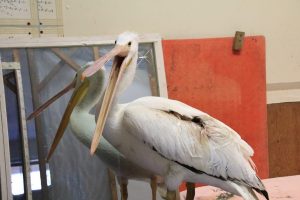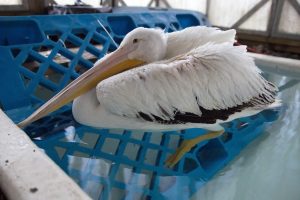Support Us
Since 1979 more than 140,000 animals have been treated by Wildlife Rescue.
Thanks to the support of individuals like you, Wildlife Rescue can provide a lifeline for animals in distress.
This week Wildlife Rescue Staff & Volunteers released an Endangered American White Pelican with his flock after seven months of intensive rehabilitation at Wildlife Rescue hospital.
On October 16th, 2019, the endangered species was on route to southern wintering grounds from Williams Lake with his migratory flock when they stopped for rest at Tuc-el-nuit Lake in Oliver, BC. A thorough vet examination indicated the Pelican’s injuries were due to entanglement in a fishing line. Peli suffered a severe injury to his left-wing leaving him grounded, a large lesion above the elbow, requiring long-term treatment at Wildlife Rescue hospital.

This was the first time Wildlife Rescue has winterized a Pelican. In order to ensure the Pelican could adapt to a new environment without causing stress, enclosures were retrofitted to meet his specific needs. Intensive ongoing treatment included aggressive wound management, daily physiotherapy, and extensive pool time, encouraging self-feeding of a healthy diet of fish and nutritional supplements.
There were some challenges along the way because of the specialized care and treatment facilities needed. Pelicans are large-bodied birds with small legs and feet. They are designed to live on the water, not walking, or sitting on hard surfaces.
With the help of generous donors, an above ground pool was purchased and set up indoors with hot water and filtration equipment to provide warmer temperatures for the winter. Peli could stay on the water for longer periods, replicating his wild behavior. Outdoor enclosures were modified for Peli to finish his rehabilitation and to get ready for a return to the wild.
After seven months of healing and with warmer weather arriving, Peli acclimated to the local climate where he learned how to spread his wings in a large outdoor enclosure.

During the spring and summer months, a flock migrates to the Williams Lake area of B.C., the only witnessed breeding ground in Canada. In the fall, they head for warmer climates in southern California and Mexico.
Biologists from the Williams Lake region have been on the lookout and recently spotted the White Pelican flock return to one of their breeding grounds at Puntzi Lake, BC. They contacted Wildlife Rescue right away to acknowledge it was safe to move to the next stage. Peli underwent his final health evaluation to ensure he was ready for release to the wild.
After 8 hours of traveling with Peli safely in a kennel, staff and volunteers arrived at Woodlands Fishing Resort on Puntzi Lake. A sizable remote area where dozens of American White Pelicans fly majestically through daily. A Pelican island exists within viewing distance, making this a perfect spot for the Pelican’s release.

As the recovered Pelican stepped out of his kennel and laid his webbed feet on his familiar breeding ground, he stretched his beautiful wings and observed his surroundings. Peli dipping his beak in the water and slowly plunging into Puntzi Lake moving toward his flock. A few Pelicans floated nearby indicating they were connecting and acknowledging Peli, a true success story for all.

Wildlife regularly encounter hooks, line, and netting in a variety of contacts and become entangled when swimming in water where this human debris has been carelessly discarded. There are also times Wildlife use fishing line and netting fragments as nesting material which can lead to entanglement of both parents and chicks.
How does improperly discarded fishing gear hurt wildlife:
How can you help protect wildlife?
Please contact our Support Centre for assistance. For additional information, visit our website here for COVID-19 protocols.